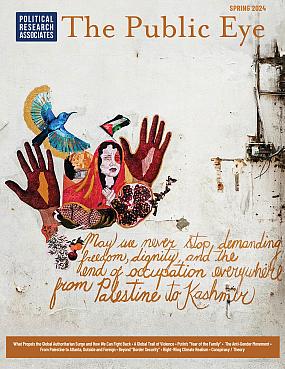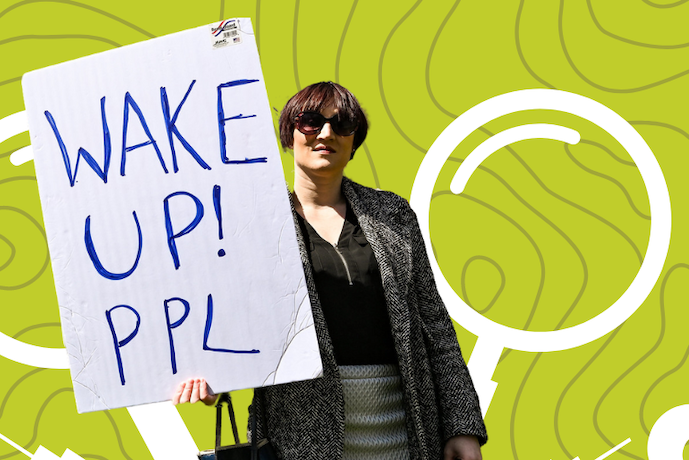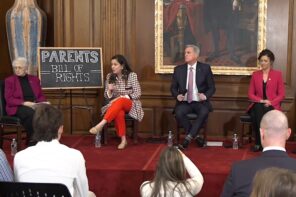Conspiracy theories and their role in popular politics have attracted enormous attention—primarily disparagement—in recent years. But what do we lose when we routinely dismiss all forms of theory that resemble oft-stigmatized conspiracy theories? And what can we learn from juxtaposing “aspects of conspiratorial thinking” with an authorized, intellectual practice of critical theory as distinct “modes of interpretive assessment” of power and causation in the world?¹ These are among the provocative questions that scholars Joseph Masco and Lisa Wedeen pursue in their edited volume, Conspiracy/Theory (Duke University Press, 2024). Their book engages the tensions and counterintuitive affinities between these two forms of worldmaking—theorized through the analytical framework of “conspiracy/theory”—across 17 diverse case studies.

The Public Eye, Spring 2024 (Issue 109) examines the far-right expansion of authoritarianism globally.
Inform your resistance: Subscribe now!
***
PRA: Your groundbreaking book makes valuable contributions to our understanding of how conspiracy theories work as well as how they do work in the world. One thing you establish is that while conspiracy theories are often portrayed as aberrations of reason and rationality, they “cannot simply be bracketed out of reasoned discourse.” Rather you cite their pervasiveness as an accessible means of rendering the complexities of the world more legible, in ways that are perhaps not so dissimilar from the aims of critical theory. Do academic critical theorists and street-protesting QAnon followers have more in common than we might acknowledge?
Masco: In fact, one of the volume’s commitments was to discern the various logics of dismissal of conspiratorial thinking and how this has served as a kind of boundary mechanism for what can be properly discussed, particularly in the US. We distinguish between conspiracy, conspiracy theory, and critical theory, and offer our own configuration of a conspiracy/theory formula to provide readers with clarifying terms they can use to interrogate the narratives they encounter and ask more precise questions about the motivations and evidentiary apparatuses of those narratives.
These careful distinctions also allow us to separate out folks who are actually trying to explain something that they’re genuinely worried about—and maybe being hurt by—in a complicated world that subjects people to imbricated systems of violence at massive scales, versus those engaged in information warfare who are willfully trying to confuse and polarize populations. We also differentiate these two categories from a third group that’s just having a blast telling wild stories online, perhaps to make a buck.
Wedeen: We also acknowledge important differences between critical and conspiracy theory while offering a new framework of analysis that can move beyond them, allowing us to explore elective affinities between them. One of these is the pleasure derived from establishing connections and unearthing dynamics of meaning and power that are not always immediately visible. Critical theorists find pleasure in connecting the dots and generating solidarities in the process, with the aim of producing a political alternative to the conventional status quo. This aspiration—the prospect of upending social and political structures, however understood—is something that critical theories and even right-wing forms of conspiratorial thought share, despite having deep differences.
You point out that those who consume or share conspiracy theories often feel they exercise analytical rigor and pay attention to evidence, which runs counter to stereotypical portrayals of conspiracy theories as superficial or irreverent towards factual truth. Is this pursuit of “truth” another affinity with critical theory? What are the political implications of this affinity?
Masco: There are many mass-media accusations of “conspiracy theory” when no theory is actually being presented. Figures like Donald Trump and his circle are making accusations to dismantle or injure their political opposition, or distract [people] from their main concerns. If you were to ask, “What’s their theory?” you would find they don’t have one; rather, their accusational politics is designed to do this work.
Our volume distinguishes between that kind of enterprise and people who are trying to understand the worlds they live in—those who experience the fundamental difficulty of understanding massively scaled, violent systems that can’t be seen in their entirety. They don’t have perfect information about how these systems emerged and what they’re doing. And yet, they know these systems affect their lives profoundly, whether it’s global finance, climate, or global militarization’s rebounding effects. These are not easy things to theorize from the point of view of an individual experiencing the world through their own cognitive and sensory capacities, with uneven access to knowledge resources.
Wedeen: To Joe’s point, we underscore how difficult it is to know something in these conditions. There’s an oversaturation of information, some things are unknowable, and the internet era has also produced a kind of high-speed eventfulness that has dramatically changed our reading practices. In turn, these conditions of “epistemic murk” make political judgment much harder than it would be otherwise. But it’s not like conspiracy theorists have a monopoly on spurious correlation. We see this in a variety of enterprises, including those that have the academy’s authorization.
Several of the volume’s contributors show how conspiracy theories can be leveraged across global contexts to empower worldmaking and ease the “epistemic precarity,” or uncertainty of knowing under such violent conditions, that you’re discussing. But you also insightfully point out that this epistemic insecurity can be hijacked for “gaslighting on a planetary scale” when conspiratorial reason is deployed by actors seeking to “hack perception and emotion” to control public understanding or consolidate authoritarian political power. I must ask, in a spirit that’s partly dead serious and partly tongue-in-cheek: is there a global authoritarian conspiracy afoot?
Wedeen: The volume tries to appreciate the kinds of hidden and not-so-hidden conspiracies that are real and partially organize our lives. They are plural, not singular, and they inherit the logics of capital accumulation, including commodity fetishism² and new structures of financialization, as well as racialized and gendered hierarchies and exploitative labor practices. For instance, one of the book’s examples is about how oil companies deny climate change while raising the height of their offshore drilling platforms.³ It’s hard not to think about such projects in terms of a conspiratorial narrative that offers some traction for understanding what’s going on in the world at present. The effort is to go beyond thinking of this as paranoid fantasy only, and as also speaking to truths in the world.
Masco: One thread linking many authoritarians right now is their dedicated efforts to control and confuse efforts to seek collective truths that people can activate their political lives around. Lisa has written extensively about this. It’s critical for being able to see the actual conspiratorial practices employed by any given state. In the US, for instance, we’ve had a multi-decade project by polluting industries and the billionaire class to do anti-democratic work to resist the expansion of civil rights and access to the vote and to control the courts in ways that have been radically successful in recent years. If you had made that claim a few years ago, it would likely have been properly captured by the conspiracy theory frame and eliminated from public discourse.
And yet, we now have decades of scholarship on this, showing exactly how that machinery was built and its aims. Moreover, it was designed to operate in stealth because it’s anti-democratic, and these policies couldn’t be achieved through democratic means. We need to be attentive to, and not be confused by, efforts to obfuscate this or to suggest that it’s pathological rather than perfectly political to imagine that a security state might not be properly transparent with its citizens, or that a polluting industry doesn’t have an interest in regulatory capture and capturing the courts.
Wedeen: We might practice a kind of attunement that embraces a sense of curiosity and humility, or political discernment that doesn’t expect that a conspiracy theory has to necessarily be false. One that understands that when people are so confused by the epistemic murk confronting them, the confusion becomes an alibi for non-judgment and conspiracy theories become a means to scale the impasse by offering other claims and ways of addressing a problem. There are many ways of doing this—my work with experimental documentaries questions the genre of conventional documentary filmmaking, for example, and art and humor can be more accessible modes for attunement that offer a more nuanced understanding.
Masco: The fact that we have many problems that we don’t have the right vocabulary for means that people are straining to come up with an explanation for something that concerns them in a heartfelt way. We should not be hardened to those efforts—we should be able to join in with them in some kind of collective enterprise. Our book makes the powerful point that there has never been a political moment that doesn’t have conspiratorial potential in it. And it reminds us that any collective act of worldmaking has a conspiratorial element to it.
While conspiracy has become a derogatory, negative discursive frame, the actual origin of the concept of “conspiracy” is about how you get together with others to dream up a potential that doesn’t yet exist and that hasn’t been done before. To maintain the easy negative frame around these practices is to cede the territory of a certain kind of collective action that I think we are all calling for to confront the real challenges of this historical moment. So, we can begin to argue for some conspiratorial practices here that are in a positive key. That includes positive conspiracies toward making a better world, one that’s potentially sustainable and nonviolent and filled with the potential for people to live better lives.
Endnotes:
¹ “Introduction: Conspiracy / Theory,” in Conspiracy/Theory, eds. Joseph Masco and Lisa Wedeen (Durham and London: Duke University Press, 2024), 1–33.
² A political economic term that theorizes how capitalist systems obscure the connection between commodities and the social relations (i.e. people and their labor) that produce them.
³ Joseph Dumit, “Adrian Piper and Alien Conspiracies of Bullying and Whistleblowing,” in Conspiracy/Theory, 269. Since the 1970s, oil companies have anticipated rising sea levels and built higher rigs to expand oil production while funding public denials of climate change.





